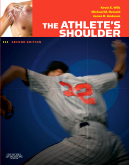|
|
|
| |
 |
|
|

|
 推薦指數:
推薦指數:





|
|
- 內容介紹
|
The Athlete's Shoulder, 2nd Edition
By James R. Andrews, MD, Kevin E. Wilk, PT, DPT and Michael M. Reinold, DPT, ATC, CSCS
896 pages 708 ills
Trim size 8 1/2 X 10 7/8 in
Copyright 2009
Description
The latest edition of this in-depth look at athletic injuries of the shoulder has been updated to feature 16 new chapters, additional illustrations and algorithms, an added focus on arthroscopic treatments, and pearls that highlight key information. Additional contributing authors give you a fresh spin on new and old topics from rehabilitation exercises to special coverage of female athletes, pediatrics, and golfers. This book offers coverage of arthroscopy, total joint replacement, instability, football, tennis, swimming, and gymnastic injuries, rotator cuff injuries, and much, much more! The large range of topics covered in this text ensures that it’s a great resource for orthopaedists, physical therapists, athletic trainers, and primary care physicians.
Key Features
Presents a multidisciplinary approach to the care of the shoulder, combining contributions from the leaders in the field of orthopedic surgery, physical therapy, and athletic training.
Demonstrates which exercises your patients should perform in order to decrease their chance of injury or increase strength following an injury through illustrated exercises for rehabilitation and injury prevention.
Illustrates how the shoulder is affected during activity of certain sports with a variety of tables and graphs.
Covers a large range of topics including all shoulder injuries to be sufficiently comprehensive for both orthopaedists and physical therapists/athletic trainers.
New to this Edition
Features 16 new chapters, including Internal Impingement, Bankarts: Open vs. Arthroscopy, Adhesive Capsulitis of the Shoulder, Cervicogenic Shoulder Pain, Proprioception: Testing and Treatment, and more.
Details current surgical and rehabilitation information for all aspects of shoulder pathology to keep you up-to-date.
Organizes topics into different sections on anatomy, biomechanics, surgery, and rehabilitation for ease of reference
Table of Contents
1. Functional Anatomy of the Shoulder Complex
2. Clinical Biomechanics of the Shoulder Complex
3. Standardized Shoulder Examination-Clinical and Functional Approaches
4. Clinical Examination of the Shoulder Complex
5. Diagnostic Imaging of the Shoulder Complex
6. Normal Arthroscopic Anatomy of the Shoulder
7. Operative Arthroscopy of the Shoulder
8. Arthroscopic Techniques of the Shoulder
9. Tensile Failure of the Rotator Cuff
10. Subacromial Impingement
11. Internal Impingement
12. PASTA Lesions of the Rotator Cuff
13. Calcific Tendonitis
14. Open Repair of the Rotator Cuff
15. Mini-Open Rotator Cuff Repair
16. Arthroscopic Rotator Cuff Repair
17. Anterior Instability of the Shoulder
18. Posterior Shoulder Instability
19. Multidirectional Instability
20. Management of the First Time Dislocation in the Athlete
21. Bankart Lesions: Diagnosis & Treatment with Arthroscopic & Open Approaches
22. Superior Labrum, Anterior and Posterior Lesions of the Shoulder
23. Soft Tissue Injuries of the Shoulder
24. Adhesive Capsulitis of the Shoulder
25. Acromioclavicular Joint Injuries
26. Shoulder Arthroplasty in the Athlete Shoulder
27. Neurovascular Compression Syndromes of the Shoulder
28. Brachial Plexus Injuries
29. Suprascapular Nerve Entrapment
30. Cervicogenic Shoulder Pain
31. Biomechanics of the Shoulder During Sports
32. Electromyographic Activity During Upper Extremity Sports
33. Shoulder Injuries in Baseball
34. Shoulder Injuries in Football
35. Shoulder Injuries in Tennis
36. The Shoulder in Swimming
37. Conditioning, Training, and Rehabilitation Concepts for the Golfer's Shoulders
38. The Artistic Gymnast's Shoulder
39. Pediatric Shoulder Injuries
40. Female Shoulder Injuries
41. Nonoperative Treatment of Shoulder Impingement
42. Non-Operative Rehabilitation for Traumatic and Congenital Glenohumeral Instability
43. Strength and Conditioning for the Preadolescent and Adolescent Athlete
44. Injuries and Rehabilitation of the Female Shoulder
45. Biomechanical Considerations in Shoulder Rehabilitation Exercises
46. Open and Closed Chain Rehabilitation for the Shoulder Complex
47. Neuromuscular Control Exercises for Shoulder Instability
48. Proprioceptive Neuromuscular Facilitation for the Shoulder
49. The Sensorimotor Contribution to the Shoulder Joint Stability
50. The Role of the Scapula in Rehabilitation
51. Alternative Techniques for the Motion-Restricted Shoulder
52. The Decelerator Mechanism: Eccentric Muscular Contraction Applications at the Shoulder
53. Neurodynamic Techniques for the Athletic Shoulder
54. Current Concepts in Isokinetic Testing and Rehabilitation of the Shoulder Complex
55. Plyometrics for the Shoulder Complex
56. Core Stabilization: Integration with Shoulder Rehabilitation
57. Conditioning of the Shoulder Complex for Specific Sports
58. Interval Sport Programs for the Shoulder
59. Taping, Padding, and Bracing Considerations for the Shoulder Complex
60. Outcome Measurements for the Shoulder
|
|
|

